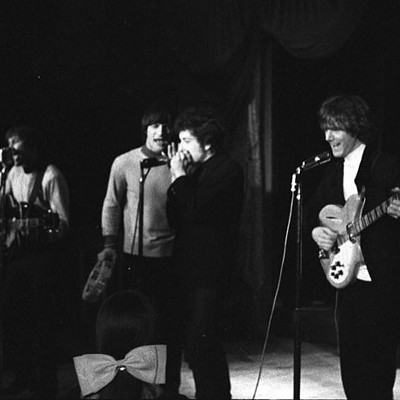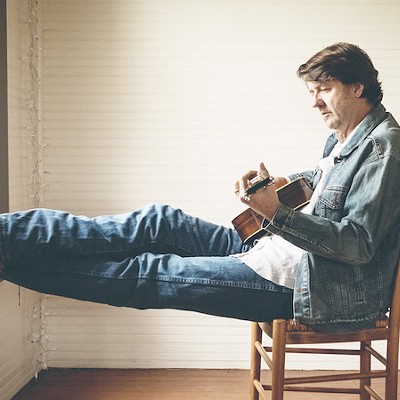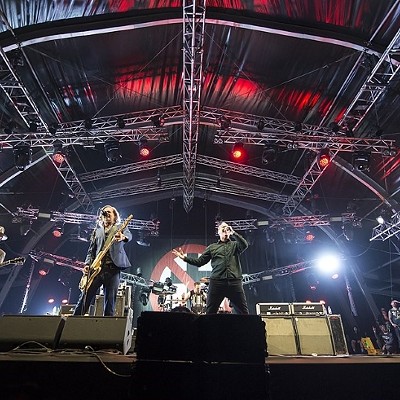Bill Kirchen, the warhorse guitar virtuoso behind some of the most familiar licks on the planet, comes to Mucky Duck Thursday to preview his latest album, Seeds and Stems, which was released June 18. Kirchen first made musical waves with his cowboy crazoids band Commander Cody and the Lost Planet Airmen, who ruled San Francisco before becoming one of the top Outlaw draws in Austin in the early '70s.
A virtuoso of the Fender Telecaster, Kirchen is not only a stellar songwriter, player, and performer whose oeuvre extends from Bakerfield truckers' twang to rockabilly, he is widely acknowledge as one of the top practitioners of his craft and has spent part of his career teaching guitar. He was a founding member of the twang supergroup the Twangbangers, formed in 2001 with Redd Voelkaert, Dallas Wayne, and Joe Goldmark.
We caught up with Kirchen at the end of a two-month tour with his band Too Much Fun that has taken him up the East and West coasts as well as a ten day detour to Europe. Less than a week from heading home to Austin, the 65-year old twanger sounded energized and enthusiastic as he talked about his history, his new record, and fellow artists Nick Lowe and Doug Sahm.
Rocks Off: You had lived in Austin, then moved back to the D.C. area, now you're back in Austin. What brought you back? Bill Kirchen: We moved back to D.C. to look after my wife's mother. But we were eventually sucked back to Austin because our two grandchildren are there.
RO: I'm sure you've seen all the press about whether Austin is hip anymore, all the people talking about how much it's changed for the worse. BK [laughs]: You know, my "hip" needs are pretty minimal at this point. We live in a regular neighborhood and we like it a lot. I've always liked Austin, it's so easy to get around and see so many different people play.
Yeah, it's hot, but that's just part of the package. And people talk about traffic being bad? Hell, I'm from the East Coast, so that talk about Austin traffic just makes me yawn. And the truth is, you can remember a bunch of places, but very few of them are unchanged. There's no way for 2013 Austin to be 1973 Austin.
RO: I read that you hitch-hiked to the Newport Folk Festival when you were 16 and saw Lightnin' Hopkins there. BK: Oh, yeah. It was life-altering. The guy I was really nuts about was Mississippi John Hurt. There's a photo of him taken from behind the stage, so you see the back of his little iconic hat he wore, and over his shoulder is this geeky 16-year-old kid with his mouth open.
But I saw all kinds of people. I was knocked out by the Jim Kweskin Jug Band, I'd never seen any of that jug band stuff. Son House scared the shit out of me. And then in '65 I saw the Dylan goes electric concert. Great memories.
RO: You started playing the Armadillo just about the time I moved to Austin [1973]. What are your memories of that period when the whole Outlaw/alternative thing started happening? BK: We were living in San Francisco and there was already a bit of an alternative scene there, so we just thought what was happening in Austin was great. I guess we played the Armadillo so many times a lot of people thought we must live in Austin. We had some crazy nights in that place.
RO: You worked with Nick Lowe a lot for a while. What can you say about that? BK: I started working with Nick on The Impossible Bird and worked with him for about ten years. He's one of those people who is just as nice and down-to-earth as he seems. In fact, I actually get nervous being around the guy, he's just that smart, he's cool, he's honest, big-hearted, soulful... plus he's got staggering talent.
RO: Any big memories of that period? BK [laughs]: I remember us playing one night in St. Louis for about a dozen people and I couldn't believe how gracious he was, how he handled that situation, which can be pretty daunting for an artist. But he was all smiles and charm.
RO: You were the guitarist on the final Doug Sahm record, The Return of Wayne Douglas. What brought that about and what was your impression? BK: You know, I was fortunate enough to be around Austin near the end of Doug's career. He wasn't doing a whole lot outside the Texas Tornados gigs, but then he got all excited by this Fort Worth bull-rider type guy, Ed Burleson. I ended up working with Doug on some of that project, and it really did fire him up to go revisit his country side.
So there I was in a room with Doug, Tommy Detamore who was producing and playing steel, the great fiddler Bobby Flores, it was just a dream session group. And then there was Doug holding court in the middle of the whole thing. Great times, man.
I remember telling Doug that he was going to be one of the rare artists in his seventies who could say he had been performing in seven decades. He was a child prodigy, you know, started when he was about four years old. Then he died in 1999, just before it would've been seven decades. I felt pretty sad about that. And it was so unexpected.
Interview continues on the next page.





